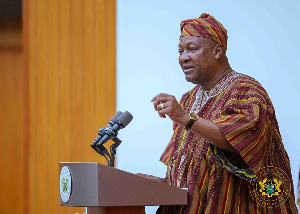Dr Seth Twum, an Accra-based Legal Practitioner has called for alternate forms of punishment for minor offences as a form of prison reform and to de-congest the courts.
He said there was the need to look at other areas of reducing back-logs of cases and suggested recordings of court proceedings, summary judgement of cases, the construction of more prisons and making them more friendly as well as the provision of educational facilities to reform prisoners.
Dr Twum said this when he appeared before the Appointments Committee of Parliament as the fifth of the nominees for appointment as Justices of the Supreme Court of Ghana. He said another way to do-congest the courts should be to follow up on the registrar summons system to ensure that cases were speedily disposed of instead of allowing the cases to pile up.
Dr Twum's academic qualifications include Chartered Accountancy in Company Law, Senior Lecturer in Law and Associate Professor and Dean, Faculty of Law Bendel State University, Nigeria and Lecturer in Law, South West London College.
His publications include "Labour problems in Ghana", "Banking Law", and “The Development of the law of Collective Bargaining in Ghana” and “Consideration and General Theory of forbearance in Contract Law".
Dr Twum stressed the importance of passing the Labour Bill so that the National Labour Commission would ensure the insulation of Government from labour unrest and deal with tripartite issues, arbitration and other schemes to iron out frustrations of workers.
Dr Twum said under the proposed Bill some category of workers whose services were essential would be provided with special incentives to prevent them from joining in strikes while the Commission would also insulate the labour market from politics and labour unrests.
On the perception of corruption in the Judiciary, he said efforts should be made to give incentives to judges to insulate them against falling into temptation to accept any form of bribes.
Dr Twum expressed regret that the Ghana Bar Association had no power to discipline its members who misconduct themselves and said it should be empowered to bring their members to book when they faulted in the performance of their duties.
On his views about the death penalty, he said life was too precious to be allowed to go waste explaining that the penalty of death for a crime could not be reversed if it was later found to be incorrect and suggested reforms in the prison system and improvement of the prisons to make them more habitable.
Dr Twum said justice should not be cheapened just because of numbers, adding that the Supreme court had five jurisdictions such as constitutional, appellate, supervisory, review and residual matters to handle state security, which required more experienced persons to handle.
He said the Supreme Court should be empowered to take decisions, adding that it was too early for any amendments to be made to the constitution about the number of judges otherwise there would be frequent amendments.
Dr Twum noted that the Interstate Succession Law was a good one and that it was morally right for everybody to have the right to the wealth of one's parents whether the children were born out of wedlock saying if such children were denied, they could become liabilities to society.
General News of Friday, 27 September 2002
Source: gna












